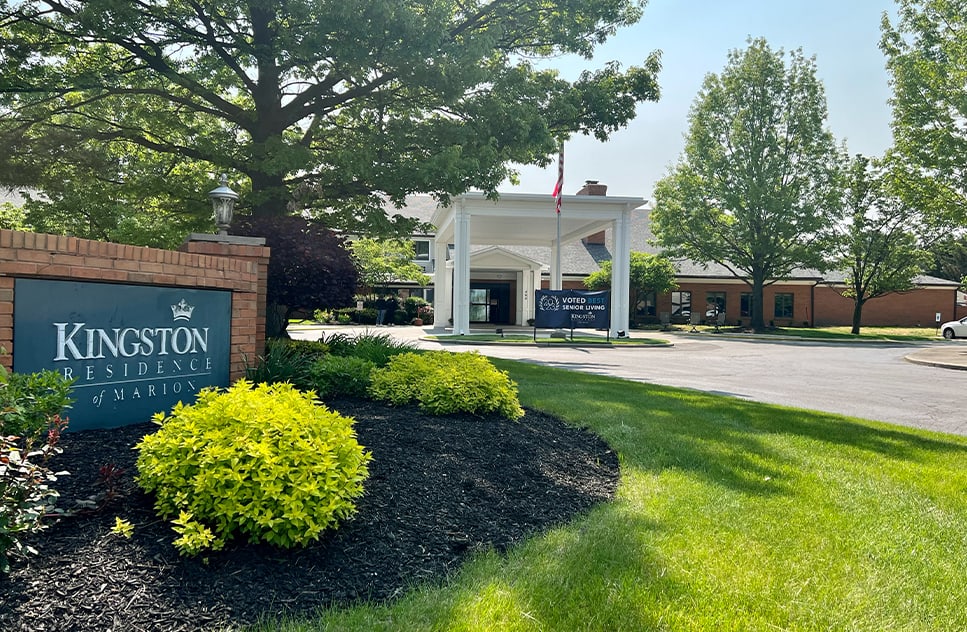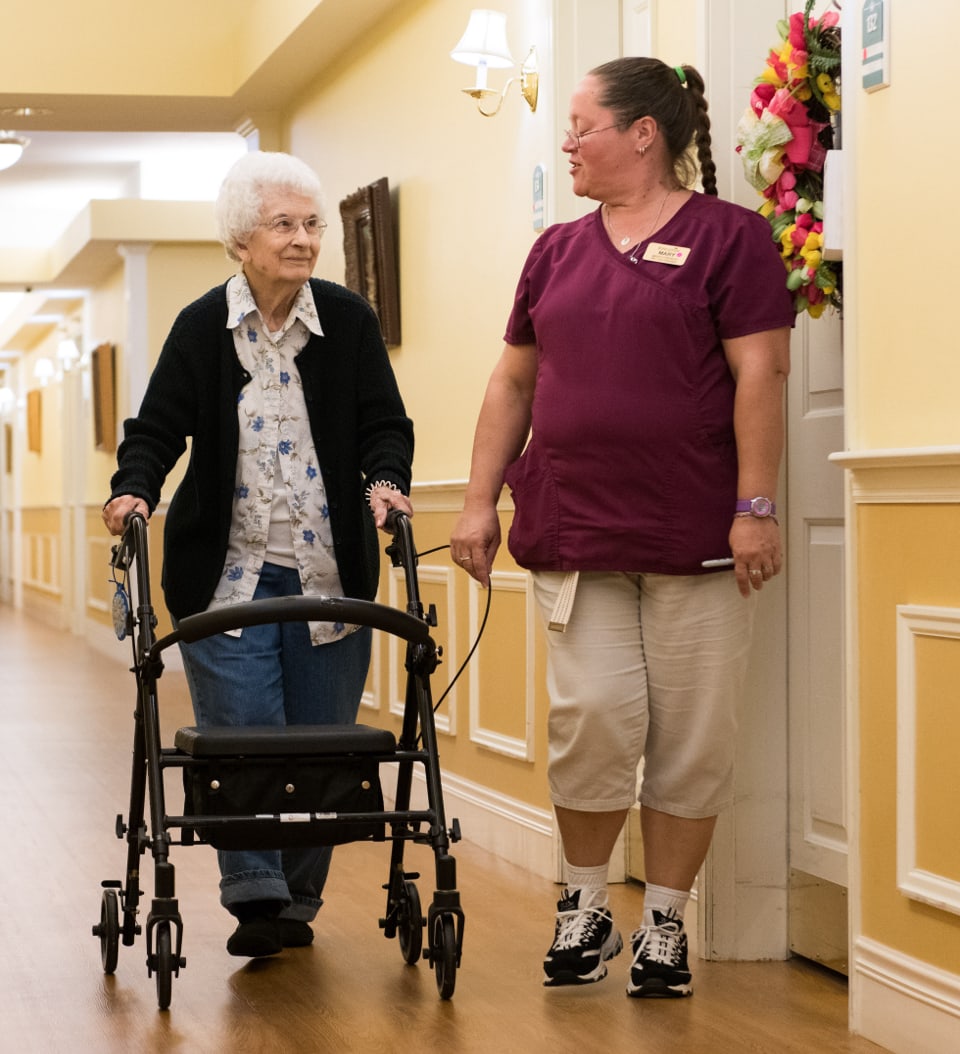Key Takeaways
- Assisted living offers a balance of independence and support, helping with daily routines but not 24/7 medical care.
- Residents typically qualify if they need help with activities of daily living, such as bathing, dressing, meals, mobility, toileting, or taking medications.
- Signs it may be time to consider assisted living include poor hygiene, missed medications, social withdrawal, increased fall risk, or the loss of a spouse.
- It’s important to understand the levels of care offered, what’s included in the base cost, and how care plans are adjusted over time.
How Assisted Living Helps
Most people want to stay independent for as long as possible. But for many families, the question eventually arises: When does a loved one need more support than they can get at home? If you’re wondering if it’s the right time to consider assisted living for your loved one, you’re not alone.
Assisted living may be the right choice when a loved one can no longer manage daily tasks safely or independently. This option provides the ideal balance of support and independence to help your loved one thrive in a structured environment. This decision is different for everyone, but certain signs can help you feel more confident moving forward.
What Is Assisted Living for Seniors?
Assisted living is a type of senior care designed to help with daily routines while supporting independence. It provides residents with a private living space and access to support when it’s needed. Whether a person needs help with their mobility or more personal support, assisted living can help.
Unlike nursing care, assisted living communities are not designed for round-the-clock medical supervision. Instead, they focus on making daily life easier and more comfortable for residents who may no longer want—or be able—to live alone.
Who Qualifies for a Move to Assisted Living?
Every assisted living community is a little different. However, in general, they support residents who need help with activities of daily living—commonly known as ADLs.
These communities offer support with:
- Dressing and grooming
- Bathing and personal hygiene
- Eating and meal preparation
- Mobility, like walking or getting out of a chair
- Toileting and continence management
- Remembering to take medications correctly
Specific qualifications can vary between communities. That’s why most offer a comprehensive assessment to determine the appropriate level of care for a prospective resident. This allows them to create a customized care plan for each resident, providing the care they need.
Common Signs It’s Time for a Move to Assisted Living
When a loved one starts to need more help than before, it may not be obvious at first. Changes can be subtle as a person’s needs adjust. However, over time, they become more significant.
A Decline in Personal Hygiene
If your loved one is wearing the same clothes for days, skipping showers, or seems less interested in grooming, it could point to a larger concern. Difficulty with hygiene often signals a loss of energy, strength, or motivation, which makes daily tasks more challenging.
Missed Medications or Poor Health Management
Forgetting medications can have serious health consequences. If you notice unopened pill bottles, confused schedules, or worsening of manageable conditions, it could indicate that help is needed to maintain safety and wellness.
Social Withdrawal or Isolation
Spending too much time alone can affect both emotional and physical health. If your loved one no longer attends favorite activities, stops calling friends, or avoids social settings, social isolation may be taking a toll.
An Increasing Risk of Falls
Falls are a major safety risk for older adults. Even one minor stumble can lead to a loss of confidence—or worse, a hospital stay. If you’re noticing unsteadiness, bruises, or hesitation to move around, it might be time to look at safer living options that support fall prevention.
The Loss of a Spouse
After losing a partner, many older adults experience grief, loneliness, or changes in daily habits. Living alone after decades of shared routines can be disorienting. This shift can highlight the need for a community that offers both support and connection.

Tips for Choosing the Right Assisted Living Community
Finding the right assisted living community is about more than just location. It’s about comfort, care, and trust. Each community has its own atmosphere, amenities, and services. Visiting, asking questions, and doing a little research can go a long way in helping your family make the right choice for long-term senior health and wellness.
Prioritize Location and Accessibility
Start by thinking about where your loved one wants to live and how accessible the community is for family visits and outings.
When looking at location, consider:
- Proximity to family and friends for regular visits
- Access to their trusted doctors and local healthcare services
- The surrounding neighborhood and its amenities
- Whether an urban or more suburban setting is preferred
These factors determine your loved one’s daily quality of life.
Understand the Levels of Care Offered
Not every resident has the same needs. Make sure the community can support current needs—and adjust if more help is needed later.
Look into the specifics of:
- The services included in the base monthly rate
- What additional care options are available and at what cost
- How the community creates and updates individual care plans
These are extremely important. Without the right support, your loved one may not be able to thrive in their new home.
Tour the Community and Ask Questions
There is no substitute for visiting a community in person. A tour allows you to observe the environment, interact with staff, and see residents in their daily lives. Come prepared with questions to get a full picture of what the community offers.
During your visit, be sure to ask about:
- Staff-to-resident ratios and staff training
- The variety of dining options and meal schedules
- Daily social activities and wellness programs
- Safety and emergency response protocols
Each of these can give you valuable insights into community life.
Find the Right Assisted Living Community Today
Making the move to an assisted living community is a meaningful step toward greater safety, support, and peace of mind for the entire family. It’s about finding a space where your loved one feels at home—with the right level of support. If you notice that your loved one is showing signs of needing more support with daily tasks, learning about your options is a great place to start.
Here at Kingston Residence of Marion, we’re always happy to answer your questions and help you navigate this process. Contact our team today to schedule a tour and explore what our community has to offer your family.






